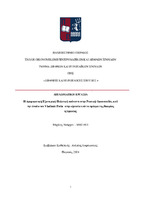Η αμερικανική εξωτερική πολιτική απέναντι στην Ρωσική Ομοσπονδία, από την άνοδο του Vladimir Putin στην εξουσία, υπό το πρίσμα της θεωρίας ηγεμονίας

View/
Keywords
Σχέσεις ΗΠΑ - Ρωσίας ; Διεθνές σύστημα 21ου αιώνα ; Εξωτερική πολιτική ΗΠΑ ; Ηγεμονία ; Αντι-ηγεμονισμός ; ΗΠΑ ; Ρωσία ; BRICSAbstract
One of the most important milestones in the history of international relations was the collapse
of the Soviet Socialist Republics in 1990, which marked the end of the Cold War bipolarity
between the US and the USSR and the transition to a new international system. The
predominance of the US, at the geopolitical, political, economic and ideological levels, made it
the sole hegemon of the international system since there was no power or coalition of powers
to compete with it at any level. At the same time, the Russian Federation as the successor of the
USSR, seeking its new position in the world, initially headed towards a Western orientation by
adopting several liberal values. These facts led to optimism according to which the victory of
American values meant the end of rivalries and the prevalence of world peace, while Russia
would gradually be assimilated by the Western international order. However, and despite
continued American primacy, developments since the end of the first post-Cold War decade
have brought to the fore a new phase in relations between the two powers. In the context of
these developments, this paper attempts to examine the strategic interplay between US and
Russian national aspirations and foreign policies from the dawn of the 21st century to as
recently as 2021. The analysis, it is attempted to be conducted mainly around the main issues
of confrontation, the conflicting interests on a multitude of issues and the hegemonic or
antihegemonic claims of the two powers. These elements are key points both for their relations
with each other and for the developments they may bring about in the balance of power in the
international system.


